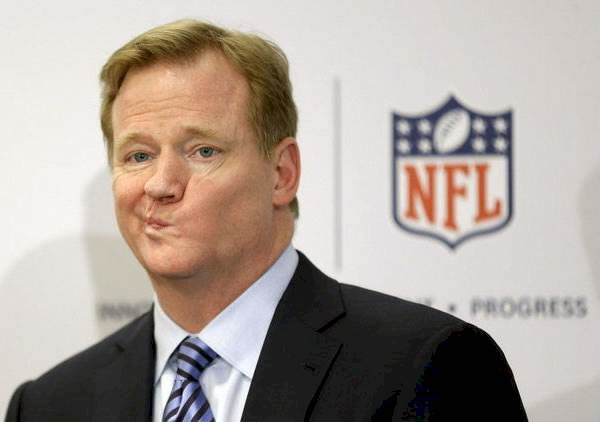Today, ESPN’s Outside the Lines reported that the NFL, which donated a $30 million research grant to the National Institutes of Health in 2012, has backed away from a $16 million study from Boston University that aims to be able to diagnose chronic traumatic encephalopathy, commonly referred to as CTE, in living patients.
The study, which was supposed to last about seven years, is trying to bridge the gap, if there even is one, between the relationship of playing football and traumatic brain injuries. When the NFL gave the money to the NIH, it was widely believed they could use the money for research however they pleased, but that’s apparently untrue. According to the ESPN report, the NFL retained “veto power” over the research projects.
The NFL’s decision not to fund the Boston University CTE study delayed its announcement for months, and the issue ultimately reached the office of NIH director Dr. Francis S. Collins, according to sources. As late as this week, some officials held out hope the league would change its mind, but the NIH remained committed to funding the project regardless.
“This problem is larger than the NFL,” said Dr. Walter Koroshetz, director of NIH’s National Institute of Neurological Disorders and Stroke. “We’re trying to get answers for people. There are a lot of concerned people out there, especially parents of kids.”
When the NFL’s “unrestricted” $30 million gift was announced in 2012, the NIH said the money came “with no strings attached”; however, an NIH official clarified the gift terms two years later, telling Outside the Lines that, in fact, the league retained veto power over projects that it funds.
NFL spokesman, Brian McCarthy, denied the report, claiming NIH makes the decisions.
ESPN story is not accurate. NFL did not pull any funding. NIH makes its own decisions.
— Brian McCarthy (@NFLprguy) December 22, 2015
However, the ESPN report says the league used their veto power after they learned the lead researcher was a guy who was quite critical of the NFL and their treatment of traumatic brain injuries.
Sources told Outside the Lines that the league exercised that power when it learned that Robert Stern, a professor of neurology and neurosurgery at Boston University, would be the project’s lead researcher. The league, sources said, raised concerns about Stern’s objectivity, despite an exhaustive vetting process that included a “scientific merit review” and a separate evaluation by a dozen high-level experts assembled by the NIH.
Stern, the director of clinical research for Boston University’s Alzheimer’s Disease and CTE centers, has a complicated history with the league. He once said NFL commissioner Roger Goodell inherited a “cover-up” from his predecessor, Paul Tagliabue. In October 2014, he filed a 61-page declaration opposing the NFL’s settlement of a lawsuit in which thousands of former players accused the league of hiding the link between football and brain damage. Stern wrote that the settlement would deny compensation to many deserving players, including some of the most severely disabled.
Whether the NFL pulled out due to who was involved is still a question. However, it might have been a reach to expect the league to give the money to NIH and not have any influence on where it ends up going for research.
Up until now they have controlled every dollar that they have spent on this issue,” said Eric Nauman, a professor of mechanical and biomedical engineering at Purdue University. Research — published without the NFL’s support — by Nauman and his colleague, Thomas Talavage, a professor of electrical and computer engineering and of biomedical engineering at Purdue, has shown that repetitive head trauma from football leads to dramatic changes in brain chemistry.
“There was no way they were going to just give that money to the NIH and say, ‘Do whatever you want,'” Nauman said.
I’m sure we’ll hear a lot more about this in the coming days and weeks, and we’ll provide an update when we do.

